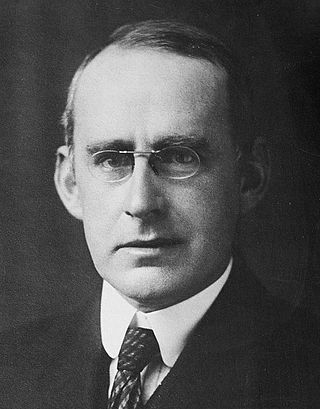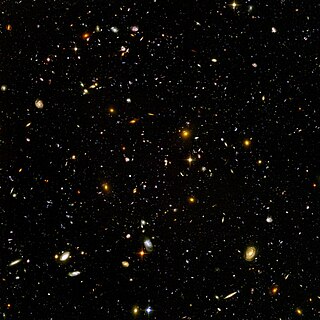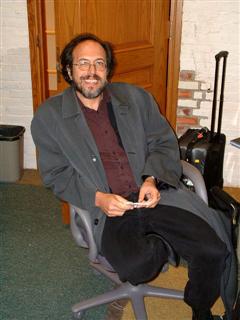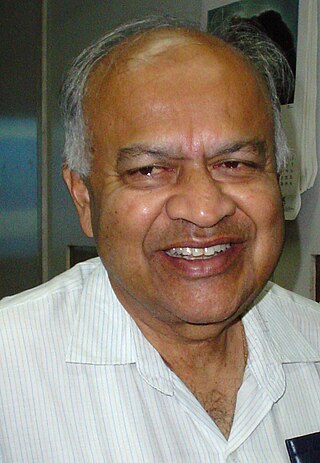
Sir Arthur Stanley Eddington was an English astronomer, physicist, and mathematician. He was also a philosopher of science and a populariser of science. The Eddington limit, the natural limit to the luminosity of stars, or the radiation generated by accretion onto a compact object, is named in his honour.

Physical cosmology is a branch of cosmology concerned with the study of cosmological models. A cosmological model, or simply cosmology, provides a description of the largest-scale structures and dynamics of the universe and allows study of fundamental questions about its origin, structure, evolution, and ultimate fate. Cosmology as a science originated with the Copernican principle, which implies that celestial bodies obey identical physical laws to those on Earth, and Newtonian mechanics, which first allowed those physical laws to be understood.

The multiverse is the hypothetical set of all universes. Together, these universes are presumed to comprise everything that exists: the entirety of space, time, matter, energy, information, and the physical laws and constants that describe them. The different universes within the multiverse are called "parallel universes", "flat universes", "other universes", "alternate universes", "multiple universes", "plane universes", "parent and child universes", "many universes", or "many worlds". One common assumption is that the multiverse is a "patchwork quilt of separate universes all bound by the same laws of physics."

The universe is all of space and time and their contents, including planets, stars, galaxies, and all other forms of matter and energy. The Big Bang theory is the prevailing cosmological description of the development of the universe. According to this theory, space and time emerged together 13.787±0.020 billion years ago, and the universe has been expanding ever since the Big Bang. While the spatial size, if any, of the entire universe is unknown, it is possible to measure the size of the observable universe, which is approximately 93 billion light-years in diameter at the present day.

Lee Smolin is an American theoretical physicist, a faculty member at the Perimeter Institute for Theoretical Physics, an adjunct professor of physics at the University of Waterloo and a member of the graduate faculty of the philosophy department at the University of Toronto. Smolin's 2006 book The Trouble with Physics criticized string theory as a viable scientific theory. He has made contributions to quantum gravity theory, in particular the approach known as loop quantum gravity. He advocates that the two primary approaches to quantum gravity, loop quantum gravity and string theory, can be reconciled as different aspects of the same underlying theory. He also advocates an alternative view on space and time that he calls temporal naturalism. His research interests also include cosmology, elementary particle theory, the foundations of quantum mechanics, and theoretical biology.

Max Erik Tegmark is a Swedish-American physicist and cosmologist. He is a professor at the Massachusetts Institute of Technology and the president of the Future of Life Institute. He is also a supporter of the effective altruism movement.

Edward Arthur Milne FRS was a British astrophysicist and mathematician.
Howard Percy "Bob" Robertson was an American mathematician and physicist known for contributions related to physical cosmology and the uncertainty principle. He was Professor of Mathematical Physics at the California Institute of Technology and Princeton University.
The characterization of the universe as finely tuned suggests that the occurrence of life in the universe is very sensitive to the values of certain fundamental physical constants and that values different from the observed ones are more probable. If the values of any of certain free parameters in contemporary physical theories had differed only slightly from those observed, the evolution of the universe would have proceeded very differently, and "life as we know it" might not have been possible.

George Francis Rayner Ellis, FRS, Hon. FRSSAf, is the emeritus distinguished professor of complex systems in the Department of Mathematics and Applied Mathematics at the University of Cape Town in South Africa. He co-authored The Large Scale Structure of Space-Time with University of Cambridge physicist Stephen Hawking, published in 1973, and is considered one of the world's leading theorists in cosmology. From 1989 to 1992 he served as president of the International Society on General Relativity and Gravitation. He is a past president of the International Society for Science and Religion. He is an A-rated researcher with the NRF.
Charles William Hellaby is a South African mathematician who is an associate professor of applied mathematics at the University of Cape Town, South Africa, working in the field of cosmology. He is a member of the International Astronomical Union and a member of the Baháʼí Faith.

Jayant Vishnu Narlikar is an Indian astrophysicist and emeritus professor at the Inter-University Centre for Astronomy and Astrophysics (IUCAA). He developed with Sir Fred Hoyle the conformal gravity theory, known as Hoyle–Narlikar theory. It synthesises Albert Einstein's theory of relativity and Mach's principle. It proposes that the inertial mass of a particle is a function of the masses of all other particles, multiplied by a coupling constant, which is a function of cosmic epoch.

Irving Ezra Segal (1918–1998) was an American mathematician known for work on theoretical quantum mechanics. He shares credit for what is often referred to as the Segal–Shale–Weil representation. Early in his career Segal became known for his developments in quantum field theory and in functional and harmonic analysis, in particular his innovation of the algebraic axioms known as C*-algebra.

Dennis William Siahou Sciama, was an English physicist who, through his own work and that of his students, played a major role in developing British physics after the Second World War. He was the PhD supervisor to many famous physicists and astrophysicists, including John D. Barrow, David Deutsch, George F. R. Ellis, Stephen Hawking, Adrian Melott and Martin Rees, among others; he is considered one of the fathers of modern cosmology.

Sean Michael Carroll is an American theoretical physicist and philosopher who specializes in quantum mechanics, cosmology, and philosophy of science. Formerly a research professor at the Walter Burke Institute for Theoretical Physics at the California Institute of Technology (Caltech) department of physics, he is currently an external professor at the Santa Fe Institute, and the Homewood Professor of Natural Philosophy at Johns Hopkins University. He has been a contributor to the physics blog Cosmic Variance, and has published in scientific journals such as Nature as well as other publications, including The New York Times, Sky & Telescope and New Scientist. He is known for his atheism, his vocal critique of theism and defense of naturalism. He is considered a prolific public speaker and science populariser. In 2007, Carroll was named NSF Distinguished Lecturer by the National Science Foundation.

Thanu Padmanabhan was an Indian theoretical physicist and cosmologist whose research spanned a wide variety of topics in gravitation, structure formation in the universe and quantum gravity. He published nearly 300 papers and reviews in international journals and ten books in these areas. He made several contributions related to the analysis and modelling of dark energy in the universe and the interpretation of gravity as an emergent phenomenon. He was a Distinguished Professor at the Inter-University Centre for Astronomy and Astrophysics (IUCAA) at Pune, India.

Jamal Nazrul Islam was a Bangladeshi mathematical physicist and cosmologist. He was a professor at University of Chittagong, served as a member of the advisory board at Shahjalal University of Science and Technology and member of the syndicate at Chittagong University of Engineering & Technology until his death. He also served as the director of the Research Center for Mathematical and Physical Sciences (RCMPS) at the University of Chittagong. He was awarded Ekushey Padak in 2000 by the Government of Bangladesh.
Marc Kamionkowski is an American theoretical physicist and currently the William R. Kenan, Jr. Professor of Physics and Astronomy at Johns Hopkins University. His research interests include particle physics, dark matter, inflation, the cosmic microwave background and gravitational waves.
Richard Battye is a cosmologist, theoretical physicist and former first-class cricketer. He is currently a Professor of Cosmology at the University of Manchester and has been the associate director (science) in the Jodrell Bank Centre for Astrophysics since 2015.













